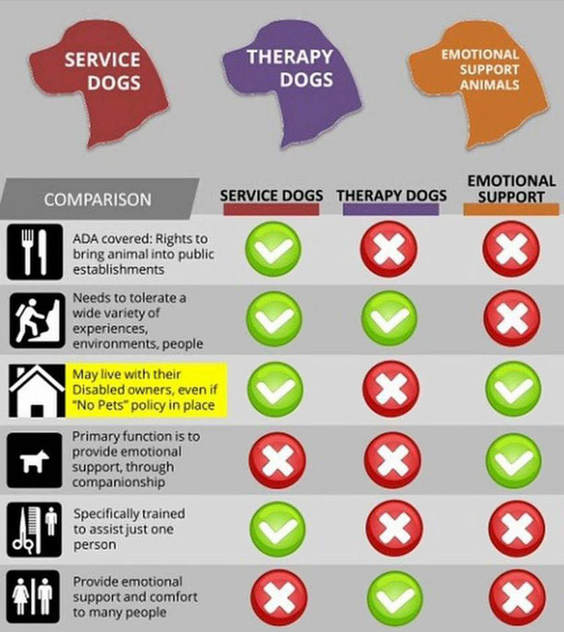Service Animal Policy
Spokane County Fair & Expo Center regulations do not permit dogs, pets, or other animals on the grounds, except:
- Animals involved in exhibitions sanctioned by the Spokane Highland Games Committee
- Trained service animals (See below for more information.)
 Comparison of Service, Therapy & Emotional Support Animals
Comparison of Service, Therapy & Emotional Support Animals
Service Animal Training:
Service Animal Behavior:
The Spokane Highland Games’ Rights:
- Service animals must be individually trained to work or perform tasks for people with disabilities. The work or task the service animal has been trained to provide must be directly related to the person’s disability.
- Service animals must be trained to behave appropriately in places of public accommodation.
Service Animal Behavior:
- A service animal shall be under the control of its handler at all times.
- A service animal must be harnessed, leashed, or tethered unless these devices interfere with the service animal’s work or the individual’s disability prevents using these devices.
- Inappropriate behavior is grounds for excluding the animal from the premises. Therefore, a service animal should not wander around, socialize, eat at the table, or be fed.
- It is reasonable to expect that the service animal not bark excessively, be disruptive, run to people or jump on them, or act aggressively toward people. The service animal is there to provide a service; it is working. Remember that sometimes it is a service animal’s job to warn its handler of surroundings or impending events, and it might do so with a bark.
The Spokane Highland Games’ Rights:
- A Spokane Highland Games Association member may ask whether the animal is a service animal required because of a disability and what work or task the animal has been trained to perform for the individual with a disability.
- Providing emotional support, well-being, comfort, or companionship does not constitute work or tasks.
- If the handler refuses to answer, the animal can be excluded from the Spokane County Fair & Expo Center grounds.
- If the handler answers that the animal makes them feel better, helps them calm down, eases their depression, or something similar, the animal's presence alone helps the handler, and the animal is not trained to do a task or provide a service.
- According to ADA's definition, Emotional support and therapy animals are NOT service animals.
Americans with Disabilities Act
- According to the Americans with Disabilities Act, only dogs and miniature horses can be service animals. Emotional support animals are not service animals.
- You may ask two questions of individuals with service animals: Is the dog or miniature horse required because of a disability? And: Which work or task has the animal been trained to perform? You may not ask about the handler’s disability or ask the animal to perform a task, nor can a handler be asked to show a prescription for a service animal.
- Service animals must work from the floor – they are not allowed in grocery carts or on chairs and couches and, in most cases, may not be carried.
- There are no state or federal requirements for certification, licensing, vests, documentation, patches, or other evidence that the dog or horse is a service animal.
- Business owners may ask that service dogs that are not under control or not house trained to leave a store or facility.
